One of the best surprises of the Trieste Film Festival Walls of Sound section this year came from Vinyl, Andrew Standen-Raz’s documentary on Vienna’s underground music scene. But to define the film as a simple photography of the electronic music scene in the Austrian capital would not be fair on this exhaustive, thorough work of narrative on today’s currents of thought, art, and musical trends in a city that, literally, never sleeps.
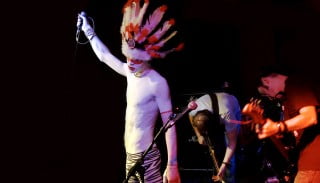
Standen-Raz leads you through a journey into the capital’s most lucid artistic minds, scores of musicians showing us what are the influences from the past that have an impact on the newest and more vibrant art movements around, shedding a light on Vienna’s authenticity and contradictions. We’ve had the chance to talk to Andrew Standen-Raz and discuss Vienna, his career in film, and the making of Vinyl with him.
Beatrice Biggio (BB): Andrew, let’s talk about Vinyl, the documentary you presented here at the Trieste Film Festival in the “Walls of Sound” section. How would they pronounce it in Vienna, by the way?
Andrew Standen-Raz (ASR): I guess it would be something like “Vinul”…
BB: Do you speak German?
ASR: Well, I didn’t learn it in school, so I miss a lot, but I get by…
BB: How long have you been living in Vienna?
ASR: Oh, God, I’ve been visiting for the last seven years, and I was more recently there in the last three years because of these film projects.
BB: But you’ve never actually moved there…
ASR: I did. It’s funny, though, initially it was just visiting, it was completely random. And then… It’s a very seductive place. Really seductive, and you get drawn into it, and, you know, the story came. And one day I just thought: “This is the story I have to make”.
BB: So, why this story? Vienna is such a seductive place, you say, and it’s full of many things. Why music?
ASR: Well, I think initially it was sort of cheesy, you know, music connects people, it’s the wordless language… And I think like with everything, if you start to go into it a bit more deeply, then hopefully you find more deep questions. So music became in a way more, you know, sound and space, and in a way how space can affect sound and the sound can affect space. It’s a dialogue, as somebody says in the film, actually. But there’s a dialogue between the two.
BB: So you decided to go deeper into music, the new electronic scene in Vienna and all kinds of old influences on that scene. The film is all played between these two concepts, the old and the new, the vinyl and its traces on the new scene. What made you decide to direct the film, though, because you are a producer, you don’t always direct projects yourself. What was the reason for you directing this film, apart from doing almost anything else in it?
ASR: Yeah, filming, directing, editing… I think filmmaking is interesting, I mean, it’s much easier now to be a filmmaker, back in the past things were straighter, in a way, you just used to be able to deal with certain areas. And now you can have a small HD camera and do your own thing, let’s put it that way. You also have distribution through the Internet, so you can become a producer and a filmmaker, really, overnight. Then it’s just a question of having a story. So my choice to direct and produce and film and now finishing with the editing, and also licensing, you know, with documentaries you have to license for your music rights, all of that was because in a way you become so close to your subject, and especially this film, it became more of an art film. So, in that way, it’s more of an artistic statement, it’s not a collection of found footage, it’s really trying to create something, and so in that sense you become more of an auteur.
BB: That’s what struck me most about the film. On the one hand, it’s like one huge visual remix, like you translated visually the electronic music re-mix concept, because of all the work you’ve done with saturation of colours, fast forward images and then time lapses, everything seems to be there, image-wise. And it made me think you were playing an electronic music set, like. And on the other hand, there’s art, all over the place, as you just said. Was that something that you had in the back of your mind all along and then sprang out while you were filming, or did someone suggest these ideas to you?
ASR: That’s a good question, absolutely. I think, what happened was I had to approach the project not as a documentary filmmaker, because musicians are naturally suspicious. You know, documentary journalism has a bad name, and in Vienna authenticity and being “cool” are very important, they’re not into the sort of histrionic “hey! let’s make a deal” kind of thing, so I had to approach it as an artist, I had to walk in and say: “Look, I’m one of you, I’ve had my problems with producers, and the system as it were, I want to create something”, and I actually had to promise them – that’s why I used a lot of time-lapses and things – that I would match the images to their music, and so I actually worked very closely with them on this. So, for instance, if they saw a clip and said: “You know, I’m not happy…” – but that happened maybe 1% of the time – then I would say: “Let me see what I can do…” Then I would think about it, and I would understand their point. So, it wasn’t me imposing my vision on them, because the music is their music, so I was constantly aware of the fact that, hey, I’m not Viennese, and I have to represent Vienna in the best way possible, and the most authentic way possible. And the other thing was that it’s their music, and I’m lucky that they’re giving it to me to use to make a movie. So, I think a lot of documentaries sometimes look at their subject as… It’s almost exploitation, and, you know, you run away and you make money from it, and a career, but you’ve left your subject behind. And so, for me it was very important that we worked together, we were all in this together. That was important for me.
BB: So you did have a feedback from all of them, about the finished project…
ASR: Yeah, they loved it. Well, actually, sorry, they haven’t seen the final, final version, because we haven’t made a premiere, so in fact you’ve just seen the final version here in Triest. So, this is the pre-distribution version, because, obviously, you know, distributors might say: “Cut this, or cut that…” Then you have to work with the distribution process at this moment and time. So this is the version that we’ll premiere in Vienna.
BB: Talking about distribution, it’s really interesting, because you have to have a strategy, in a way, when you’re taking films all over the world, especially to festivals. I would imagine that not all festivals are alike, and some of them might be more business-oriented than others. In what percentage do you choose a festival for its pitching potential as opposed to the artistic significance?
ASR: You know, we’re humans, everybody’s a human and we react in human ways, and often it’s easier when somebody says: “That’s good”, then you say: “Oh, is it really?” And to get noticed is very hard, I mean, the equipment means that more people can make movies, and the job of the festivals is getting harder and harder, because they’re getting more and more stuff coming at them, and they have to wade through this, so it helps when you have people that help from the inside, who say “By the way, you should look at that, because it’s really good!” So, it’s really hearsay, you know, a film, once it’s in a cinema, it rises or falls based on the hearsay. So you kind of get chosen, but if you know how to work the system, then obviously you’ve got more control. And often some producers are being such veterans that they can move around and talk to people, and… So, it depends. This is my first solo project, and at this point it’s wherever the wind blows, I’m lucky. But I will say this: I’m not into it necessarily. It really depends, if you really make something to be a product to sell, and you see it as a stepping stone in your career, then you should have a really serious plan. But I’m making this as an artist, and, yes, I would love to make money from it, but not in a way that destroys the purpose.
BB: That makes sense. You started your career by making things like stop motion animation, and shorts. How did it all come to this?
ASR: Yes, you know, it’s funny, because I actually talked with somebody today on whether they should go to film school or not, and I did go to film school, at that time I did make a choice. TISCH, the School of the Arts in New York was supposed to be one of the best schools at the time, so I got a degree. But, you know, film is about doing, it’s like anything else, the more you do, hopefully the more you learn from your mistakes, and you eventually get to where you’re going. And you have to have a story to tell, obviously. And I think that for me, I started out, really, going the wrong direction, so after film school, which was quite expensive, I then went to work for some film studios, and I wasn’t making movies, you know, I was in the movie industry, but I wasn’t actually making movies. And so it really was about taking risk, and you have to take a risk in your life. And once you jump… you know, I was lucky, I guess, in a way, that, having worked in the industry for so long and having worked for companies, I knew what not to do, to some extent, so I didn’t know that, let’s put it this way, I did learn technique at NYU that was very useful, at TISCH, but in terms of really having a story, I mean, if you don’t have a story, forget it, you know. It’s better to wait until you have a story and then worry about learning how to become a filmmaker.
BB: Going back to Vienna, and Vinyl, and talking about stories, this morning, during the press conference, you said something really interesting about Vienna, and maybe Europe at large, and Eastern European countries in particular, having this identity where they tend to reflect upon themselves and their history rather than going following trend after trend, and it’s something we find in the documentary, too, as far as music goes…
ASR: Yeah, definitely.
BB: But there’s something that I can’t quite catch there. I mean, starting from that scene in the film where that punk bloke goes all obnoxious, and then one of the artists says something like “It’s not always necessary to shout, to be that loud, to pass a message, we just want to hear the silence now and again”. I can understand that, and it makes sense, but on the other hand, don’t you think it leads to a sort of stagnation, to inaction, in a way?
ASR: You’re absolutely right. You know, I’m English, I’m absolutely multi-culti-mix, and so, part of my mix is native American and part of it is also Cajun and Creole from Louisiana, so I’m half Irish, English, and I went to an English public school, so my identity on some level is that, but my identity is also shaped by other things, and if people in America were not taken to the streets, I wouldn’t have the chance to make a movie today, I wouldn’t have the vote, it would still be acceptable for me to sit at the back of a bus or to drink at a different water fountain, so I think that obviously you have to shout at some point. Today we have a big problem, because there are many people who believe it’s ok to blow themselves up in order to make a point, and that’s the extremes of this expression of frustration and anger, you could say, on some level. On the very other hand it’s important to say you need to be introspective, you know, to look inside yourself, and I guess the journey of life is – that’s why I mention Socrates too, you know, “the unexamined life is not worth living” – that before you shout, do the examination. And I think that’s the thing.
BB: Yes, you do have to do that. I really strongly believe that. I mean, you need a strong basis to then be able to do things.
ASR: I was in a café once and that was funny, because I heard these people talking and I just thought, like, these people sound so stupid, you know, I was being very, very snobby about them and this woman said: “You know, when you really think about it, have we really evolved?”. And I thought, well… that’s the best question you could possibly ask, because we all admit that we keep going in cycles of history, and we all say, oh yeah, that’s what we do, we’re humans, right? We’re crazy. But the reality is that on some level we do need to evolve, and so therefore the arts and film and documentary, it can’t just be about reflection and astoundure, which again, is kind of what we’re dealing with now, but it has also to, to some extent, be about introspection, so I think with my film, it can be difficult, I think, on some level, maybe I could have put less questioning in it, it makes it more tough, but I think it’s important to have those questions in it, to have that dialogue.
BB: Have you kept in contact with the art scene in England on some level at all?
ASR: I mean, it’s difficult, one day I woke up and I thought: “My God, I’m an ex-pat!” And I grew up thinking that these are like Jensonian ex-colonials, you know? So, I’m like: “That’s me? Oh, my God, it’s horrible!” I mean, it’s important, because I think with film festivals sometimes there’s an element of… you know, this is a Serbian director presenting a Serbian film, and so on and so forth… I don’t fit in any categories, I’m an Englishman with mixed roots presenting a film about Vienna that involves mostly Viennese artists, and I’m here in Italy and various other places. I don’t know, it’s funny, Karl Popper – because he was very much affected of course by the II World War – he thought that music should be divorced by nationalism. And it was difficult at times, because I thought: “Hey, I’m making a film about music in Vienna!”, so I was trying to present music that was Viennese, but at the same point and time, music is music, and sound is sound. It’s like at the end Fleischmann says, you know, “I’m just one guy in Vienna, making music, I don’t know what typical Viennese music’s supposed to be like” and he laughs, and he just thinks it’s a stupid question, you know.
BB: Are you interested at all in video art?
ASR: Very much. In fact, I’m doing two things now, which are my main thing. One of them is… Well, I initially started this project – which I think I mentioned, also, in the press conference – I initially started this film as a grander film: it included politics and society, and it was really this whole session called “Speech”, ‘cause I thought speech is also sound in space, therefore it fits the category, and I was lucky in a sense, because after Haider died, a much more evil right wing guy came along, a guy called Strache, and therefore we had a perfect antagonist, in a way, for the movie. But then I realized I couldn’t match the two things, this film and the other one – I call it “the bastard child” of Vinyl –, which is called Vienna – Not everything will be taken into the future. So, again, it’s a film about Vienna, it’s a slice of space and time, but it’s also about the things that we may or may not, that we personally may or not wish to go to the future, maybe some things do, some things don’t, some things we have no control over. So this is the second film, in a way, so the other side of the coin, it’s the overground politics and society, I think you’d enjoy this one. And the other one, I took Vinyl and it was presented at the Austrian Culture Forum in York, and the Austrian Culture Director, actually, is a lovely guy, Andreas Stadler, and he’s been a great supporter of the film, because within Austria it’s difficult for an outsider to come and present Austrian culture, and also some people didn’t like that I made it in English. But for him, because he’s the Austrian Culture Forum Director, it made sense, because we’re trying to make more people see the film, and more people share Vienna, but it is what it is, as Suzie Sweet says in the film there’s a folk music perversion there. So, Vienna will be coming out, and Vinyl, what I did was I showed it in this art gallery, and a friend said, “you know, Andrew, this film, you should turn it into an art project somehow”. So I thought about it on the plane home, and by the next couple of days I just sat there thinking… so, I’ve actually created an art project, an installation where I took the three streams, the black and white interviews, the colour performances and the colour street scenes, three separate beamers, and the idea is that you could walk into a kind of a cube space and you’re surrounded by the images looping around, but you hear the soundtrack playing steadily, so it’s like life itself, you hear, like, for instance, here, we’ve got the sounds from the hall of the hotel, we’ve got the cheesy music, the wind blowing, people talking coming in and out, and all of this is part of our little soundscape here. And so, in a way, we learn things in a very disconnected, disjointed way, and so this was my idea with this installation project, you see the film, but you’re experiencing it differently, maybe you look over here, maybe you look over there, maybe the sound matches sometimes, or it doesn’t. But it’s how we experience life in itself.
BB: I was very interested in your future projects with Onno Ennoson, is that right, you have something planned with him?
ASR: Yeah, various projects…
BB: He just stands out of the screen, somehow, as if there’s something more behind that interview…
ASR: Yeah, we have developed a project… Onno is actually a really interesting guy, he’s a deep thinker, he’s really been instrumental in helping to change the course of my film. He’s done a lot of projects about William Burroughs, and there’s a festival called the Donau Festival, in Krems, which is a lovely festival, and it’s new music, new art. So he called me one day, and he said “Look, I wanna do something” and we talked about it and figured out how we could collaborate as a filmmaker and as a sort of pure artist, and so we worked together at this very interesting collaboration. And this was premiered last year, so we hope to do it again. And this is now my third collaboration with Austrian artists, so it’s something that, being there, is just something that happens to be in the space, so it’s been interesting to develop my art as well.
BB: I’ve seen something on the net about one of your production projects, which I found really interesting, and it’s the Kathy Acker documentary. Can you tell me about it, because there’s some footage online, but I’d love to hear something more from you.
BB: Yes, I do.
ASR: Well, there’s not a lot of people who really know Kathy Acker, so… I’m very impressed.
BB: Well, I know her because of my activities in a women’s shelter…
ASR: Ok, I see now. Actually, I’ve been talking about women’s issues all day, in fact I’ve met this really interesting photographer who lives here, she’s done really beautiful photographs in Afghanistan, Monika…
BB: Monika Bulaj. She’s fantastic.
ASR: Wow! And we’ve just had a coffee with her in Miramare, the castle. So, I think women’s issues are huge for me, I notice the small things, you know. It was me that asked this morning, about Cinema Komunisto why there were no women in the film, I was also wondering why even in Cirkus Columbia women were often in a very secondary role, you know. So, I think, when I got the chance to do this, I though “Great!” I understand injustice, and Kathy Acker I thought was really interesting because… I personally have boundaries, but I respect people who can push the boundaries, I mean, we all do. Because we live so hypocritically a lot of the time, and she basically said very clearly… you know, she talked about the road, and that there’s the boundaries of the road, and if you jump outside the boundaries you put yourself in a very difficult position, and that’s why so many people want to stay there. And I think she felt that her life and her loves were very difficult, but this was my first collaboration with an Austrian artist, actually. It was a difficult project, we had a lot of money, and we had a lot of time, and we had a lot of people… What happened was I started the collaboration, and at the time I wasn’t actually in the film industry, and I got more and more involved in it. Barbara Caspar, who was making the film, is an artist, and what they needed was a filmmaker, so I got more and more involved in the film, so by the end of the film I was essentially everything: co-producer… I mean, you’ve seen my list of credits, it’s ridiculous… And, funnily enough it was a question of identity as well, because I couldn’t be the face of the film, I couldn’t kind of share in all the ways possible, so they had to find a role for me that was fair… But it’s funny because from that period of time I keep on running into people that I’ve met through that film. One of them is the widow of Orson Welles, Oja Kodar, she’s Croatian, and I made a deal because Kathy made a piece on Don Quixote, and so I needed a little clip from that, and I managed to track her down, we became friends, she gave it to us for next to nothing, and she’s also going to give me a little piece of Orson Welles for the beginning of the Vienna film that works perfect there, it’s a beautiful quotation. Then there were people like Lydia Lunch and Nick Zedd. And weirdly, I was partying last night, because one has to, you know, you can’t do all this hard work all the time without partying (laughs), and Marco Bellini, this crazy dj, was playing with hardcore pornography in the background, and suddenly I thought “I recognize that face…”, and it was, like, Lydia Lunch. And I met all of these guys in New York, because they were all in the same scene, and Kathy also did some basic porn movie stuff, the famous Blue Tape which is in our movie. So I met Lydia Lunch last year and I got the chance to film her with a new 7D camera, which is kind of cool, for an Australian documentary on Nick Cave, from the Bad Seeds. So that was kind of weird, meeting her and having the Kathy Acker connections. So thanks to this Austrian artist bringing me this kind of project I’ve ended up following this kind of path through all this has become interesting.
BIO
Andrew Standen-Raz has worked as a documentary researcher, film studio executive and producer. He was co-writer and co-producer on Who’s Afraid of Kathy Acker? for ARTE. He has collaborated with many an Austrian artist for the creation of video installations. Vinyl: Tales from the Vienna Underground is his first solo project.

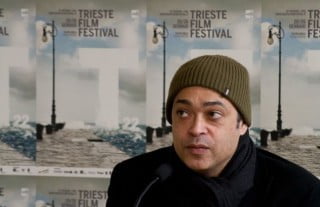
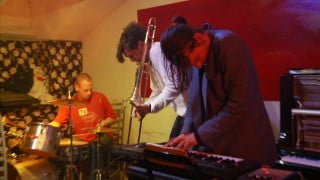
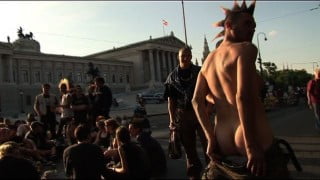
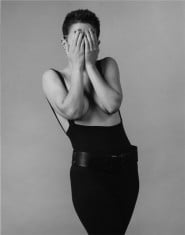




































Commenti
Trackbacks/Pingbacks
[…] This post was mentioned on Twitter by TriesteFilmFestival , Giovanna Tinunin . Giovanna Tinunin said: 'Vinyl scratches into the future', an interview with Andrew Standen-Raz http://bit.ly/hfzVJc #TSFF22 #WallsofSound […]